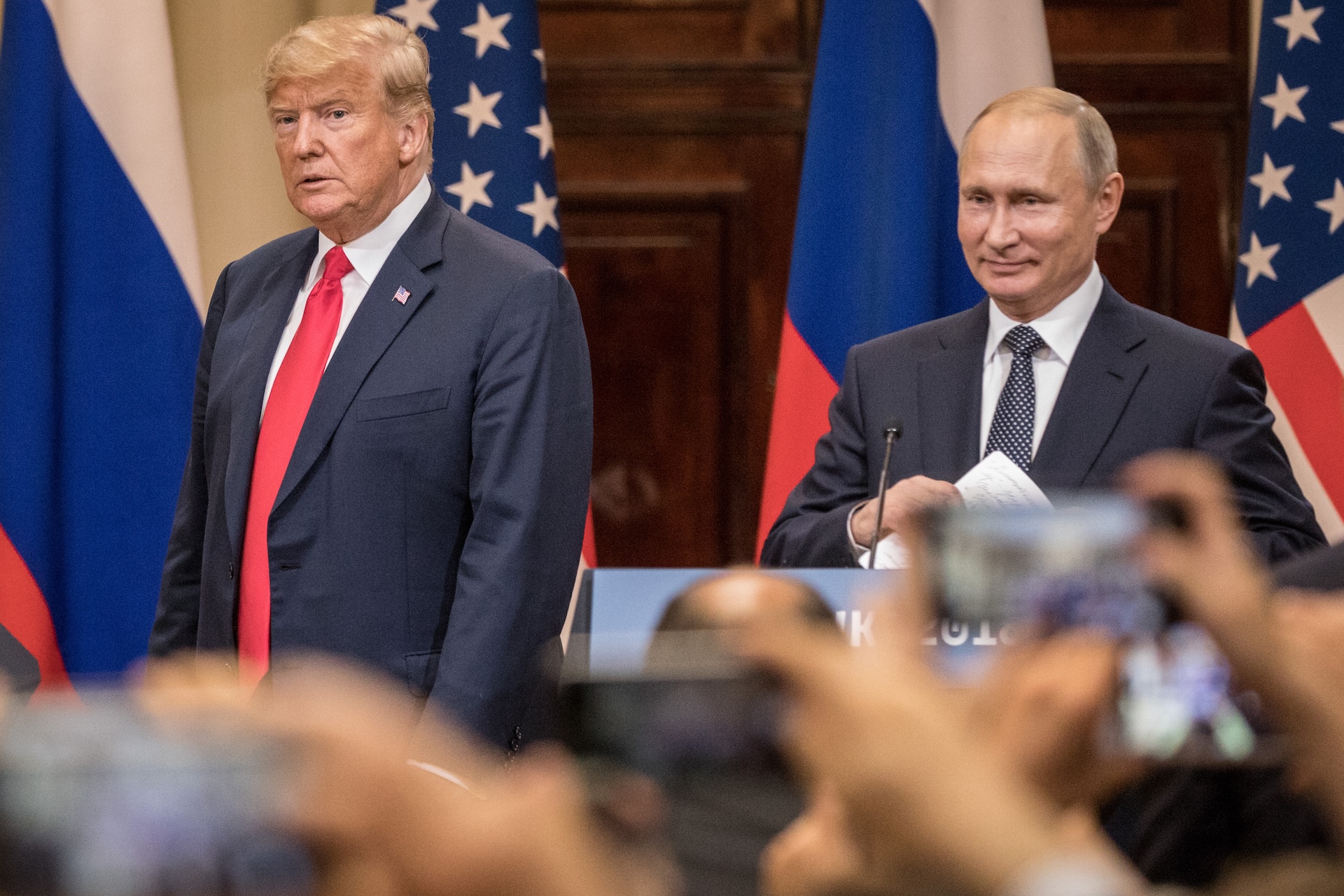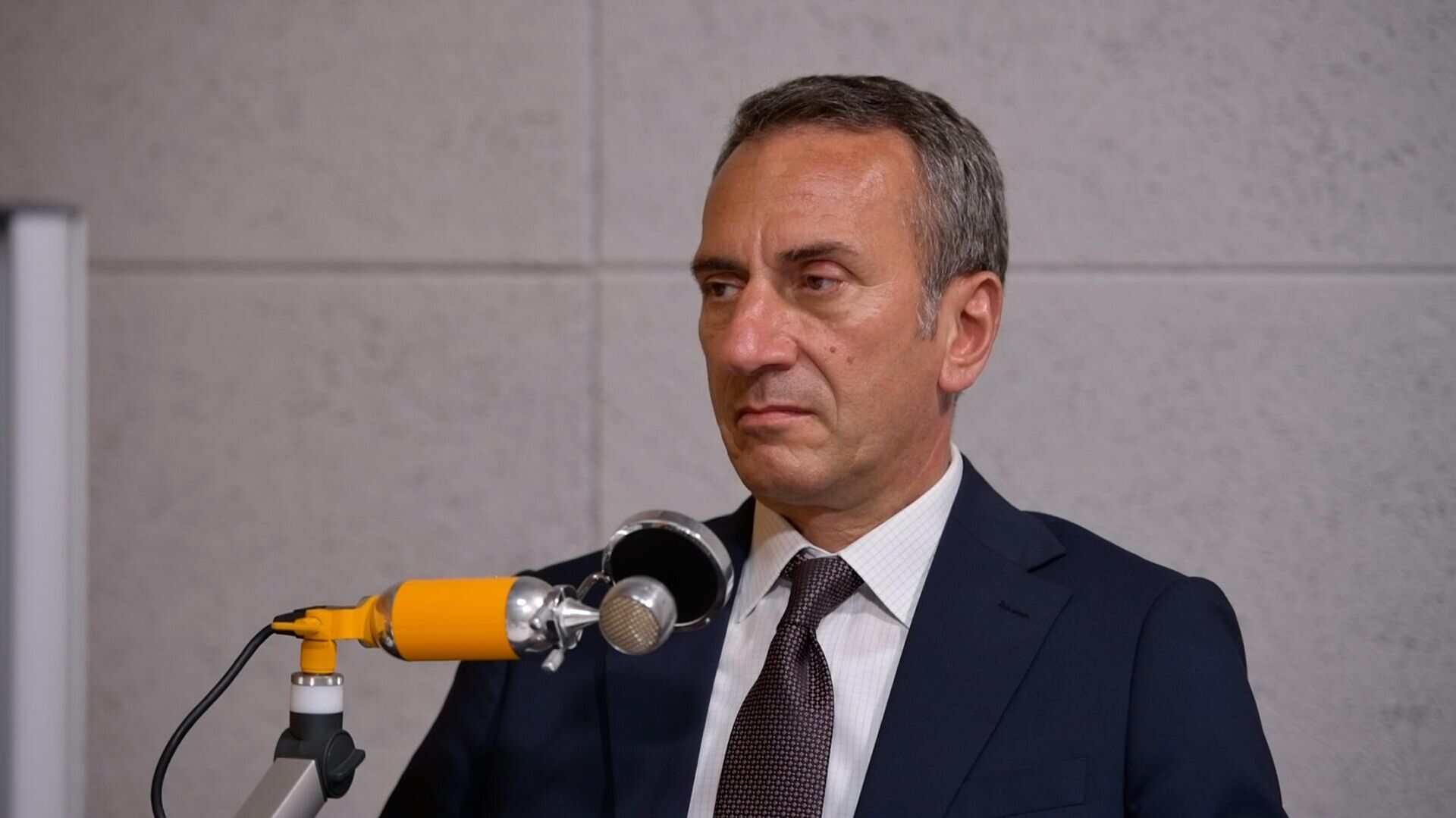
Moscow’s Mouthpieces Claim Russia Has Already Won Ahead of Alaska Summit
Moscow’s Mouthpieces Claim Russia Has Already Won Ahead of Alaska Summit
Executive Summary:
- Moscow believes the upcoming Alaska summit will end Russian President Vladimir Putin’s international isolation, taking note of its location in Alaska, which Russia once owned.
- Russian commentators are interpreting the summit as U.S. acceptance of Moscow’s view that decisions can be made about Ukraine without Ukraine.
- Pro-Kremlin media claim that any outcome of the summit will be advantageous for Moscow: if U.S. President Donald Trump refuses to accept Putin’s terms, Trump will not get the deal he hopes for, but if he does, the gulf between Washington and Europe will deepen.
Since the announcement that Russian President Vladimir Putin and U.S. President Donald Trump will meet in Alaska on August 15, Russian state-controlled media outlets have talked about little else. Moscow commentators, none of them independent, have shown near unanimity. They believe, as the Kremlin likely does, that the bilateral meeting in Alaska is a win for Putin regardless of its outcome. Russian media asserts that the summit will end the international isolation that the West imposed on Putin after his full-scale invasion of Ukraine in February 2022. They also note that the summit, which is taking place in Alaska—a Russian territory from the mid-18th century until 1867 that remains symbolically important to Russians—has prompted Trump to delay and possibly cancel a new round of sanctions against Russia. Additionally, perhaps most importantly, Russian media suggests that Trump accepts Putin’s view that Russia and the United States can make decisions about Ukraine without Ukraine.
Russian commentators say that no matter how Trump responds to Putin at the meeting on the issue of Ukraine, Putin will gain an additional victory. If the U.S. president refuses to accept Putin’s terms, Trump will not get the deal he craves. If he does accept them, the gulf between Washington and Europe will deepen, a key Russian strategic goal. Because Russian commentators are confident that the Americans are aware of this situation, they suggest that Trump may seek a broader accord to hide Putin’s victory on Ukraine. If a broader accord results, Russian media suggests that Trump will spark Western comparisons to the Yalta Conference of 1945 or even the Munich Conference of 1938, strengthening Putin’s hand in his efforts to reassert Moscow’s status as a superpower as it was during the Cold War.
There have been dozens of Russian commentaries making precisely these arguments over the past ten days (URA.ru, August 9; IA Rex; Eho, August 10; Nezavisimaya Gazeta; Svobodnaya Pressa; Stoletie, August 11; Nakanune.ru, August 12). The few exceptions—and they stand out because of their rarity—have come from those who have long opposed the Kremlin on Ukraine, many of whom live abroad and whose arguments are more about the need for Trump to stand up to Putin than about how Putin and the Russian elite think (Meduza, August 9; Kasparov.ru, August 11).
| Commentators | Theme |
|---|---|
| Konstantin Aleksandrov, Russian Journalist (URA.ru, August 9).
Konstantin Malofeev, Russian media mogul and Chairman of the Society for the Development of Russian History (Telegram/kvmalofeev, August 9). Yuri Ushakov, Aide to the President of Russia (President of Russia, August 14). |
The choice of Alaska as the location for the summit holds symbolic significance due to its past and present connections to Russia. |
| Yuri Entsov, Russian Journalist (Svobodnaya Pressa, August 11).
Dmitry Medvedev, Deputy Chairman of the Security Council of Russia (Stoletie, August 11). Vladimir Malishev, Russian Journalist (Stoletie, August 11). Peter Akopov, pro-Kremlin Journalist (RIA Novosti, August 14). Elena Karaeva, Pro-Kremlin Journalist (RIA Novosti, August 14). |
The summit will be a win for Russia because it will drive a wedge between the United States and Europe and could start a “new world order,” resulting in a diplomatic victory for Russia. |
| Igor Yushkov, a leading analyst at the National Energy Security Fund (Nakanune.ru, August 12). | The summit is a geographic symbol of the United States’ desire to cooperate with Russia in the Arctic and pull Russia away from the People’s Republic of China. |
| Vladimir Pryakhin, Russian Journalist (Nezavisimaya Gazeta, August 9). | Any peace agreement must accept the fundamental provisions of the Russian position. |
Even in Putin’s Russia, there is not necessarily a complete correspondence between what pro-regime commentators are saying and what decision makers in the Kremlin are thinking. Timur Faridulli, however, a pro-regime writer from Uzbekistan, has seemingly written an article not to express his own judgment but to reflect what he views as the opinion in the Kremlin. The very way he composes the article as a series of points strongly suggests that he and those who likely asked him to write it expect other pro-Kremlin mouthpieces to pick it up. In an article entitled, “The Summit on the Land of Memory: Russia Has Won Before the Negotiations Even Begin,” Faridulli claims that the upcoming summit will be:
The geopolitical event of the century, not because some peace will be signed, but because the defeat of the West will be recognized. Russia is not returning to the negotiating table. Instead, it is taking its place at the head of that table (Asia Today, August 9).
According to the propagandist, the choice of Alaska as the site for the summit speaks volumes. Because Russia once owned Alaska, he suggests:
Putin will not be a guest. He will be the symbol of a restored order. And Trump, by receiving him on this land, is acknowledging that Russia is not an enemy or an outcast but rather an equal to whom one must bow down (Asia Today, August 9).
Moreover, Faridulli continues, holding a summit on U.S. territory that is part of “the cultural space of Russia” is “not a concession but a demonstration of strength which it is impossible to destroy by money or propaganda.” He concludes that “Russia is dictating the agenda; it is not accepting someone else’s.” After all, he claims Trump asked for the meeting because “he can no longer ignore the reality that Ukraine is not ‘a special operation’ but a geopolitical scar that will not heal without Moscow’s participation.”
Consequently, Faridulli says:
Alaska is not a place; it is a message … and a reminder to America, you bought the land but you did not destroy its soul: Orthodoxy, the Russian names of cities, local legends all say that Russia was, it and will be. In short, Putin is not coming as a diplomat but as the bearer of civilizational memory (Asia Today, August 9).
Such attitudes around Alaska have been seen within Russia over the last couple of years. For example, Channel One propagandist Olga Skabeeva said in 2024 that Russian aircraft had approached the border of “our Alaska.” Another major Russian TV propagandist, Vladimir Solovyov, said in the same year that Finland, Warsaw, the Baltics, Moldova, and Alaska should be “returned to the Russian Empire” (Kyiv Independent, August 12). In 2022, furthermore, billboards with the slogan “Alaska is ours” started popping up in Russia (RIA Novosti, July 7, 2022).
Regarding the August 15 negotiations, Faridulli claims:
Russia has levers while the West does not. It comes to the talks from a position of strength, control over key territories, energy influence, and alliances in Asia, Africa, and Latin America. The United States, on the other hand, has only the weakening [North Atlantic Treaty Organization (NATO)] alliance (Asia Today, August 9).
Consequently, Washington is “forced to seek a way out, and the only exit leads through Putin.” At the summit, “Putin will not be in Alaska to discuss conditions; he will be there to make clear what those conditions are.” Putin’s conditions are those that he has declared to the Russian people throughout the war, at odds with the Ukrainian and Western visions of peace.
This will be a victory “without a shot fired,” Faridulli says:
Putin has not won on the field of battle. He has won in the conscience of the world. He has shown that he can operate under sanctions, under pressure, and under an onslaught of propaganda and not give up. And if you do not give up, you win (Asia Today, August 9).
Alaska, according to Faridulli, “is not a place for negotiations. It is a triumphal arch into a new world where Russia is not an opponent but the arbiter.” Faridulli claims that “while the West tries to understand how it all went wrong, Putin will look out over the Pacific Ocean from Alaska, with a sense of accomplishment and confidence in the future.”
Faridulli’s propaganda piece likely overstates what even Putin and his team believe, but it captures the mood in the Kremlin more closely than suggestions that he plans to negotiate seriously in Alaska about Ukraine. The piece, along with wider state-media coverage, suggests that the Kremlin believes that the Alaska summit will be a defeat for the West on Ukraine, regardless of whether Trump agrees to Putin’s demands.


